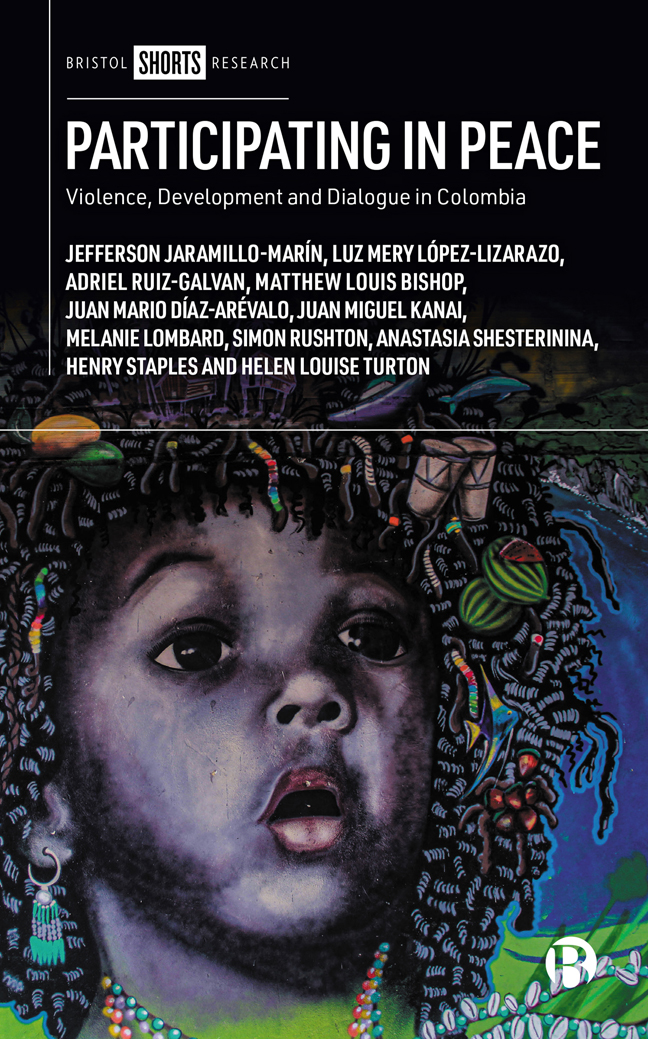Book contents
- Frontmatter
- Contents
- List of Maps and Tables
- List of Abbreviations
- Notes on the Authors
- Acknowledgements
- Note on the Cover Image
- Introduction
- One Peace through Participation: The Colombian Experience
- Two Participation through Dialogue: Co-Producing Peace and Research
- Three Protecting Catatumbo: Dialogue as Conflict-Sensitive Environmentalism
- Four Transforming Buenaventura: Dialogue for Municipal Peacebuilding
- Conclusion
- References
- Index
Two - Participation through Dialogue: Co-Producing Peace and Research
Published online by Cambridge University Press: 24 January 2024
- Frontmatter
- Contents
- List of Maps and Tables
- List of Abbreviations
- Notes on the Authors
- Acknowledgements
- Note on the Cover Image
- Introduction
- One Peace through Participation: The Colombian Experience
- Two Participation through Dialogue: Co-Producing Peace and Research
- Three Protecting Catatumbo: Dialogue as Conflict-Sensitive Environmentalism
- Four Transforming Buenaventura: Dialogue for Municipal Peacebuilding
- Conclusion
- References
- Index
Summary
Dialogue cannot be a panacea for all conflict challenges, nor did the social leaders and community members engaging with our project expect it to be. Their main priority was to find pragmatic ways of addressing ongoing problems and bringing improvements to their territories, often through de-escalating ongoing violent conflicts and finding strategies to avoid overt confrontation. Many participants shared concerns that latent tensions were being intensified by the failure to implement key parts of the peace agreement. Yet, we found that a broad range of social actors saw value in community-driven peacebuilding through dialogue. The main aim of this chapter is to introduce how methodological approaches and ethical sensibilities from Participatory Action Research (PAR) can open up opportunities for researchers to work alongside social actors in the co-production of such dialogues, instead of merely documenting them. We focus in particular on the format of diálogos socio-territoriales (DSTs), which the chapter also defines in more depth.
We must begin by recognizing that territorially rooted, dialogue-based modes of participation were not, for the most part, created de novo after 2016. Such efforts have been part of communities’ repertoires of ‘peacebuilding from below’ for decades (Jaramillo Marín et al, 2018). Community-based organizations have frequently created and convened participatory spaces when state actors have proved unresponsive or unable to interpret their claims (Archila, 2019). Yet, these dialogues have not been adequately recognized either by the literature on peacebuilding, or by the national peace agreement's promises of citizen involvement in the construction of ‘territorial peace’. In many cases, the invented spaces of dialogue that communities have sustained in the ‘post-conflict’ period have been a continuation of, or have built upon the foundations of, those previous efforts. They have also continued to adapt to changing (post-)conflict circumstances, in doing so producing innovations that have opened up further avenues for participation, the construction of peace and pursuit of life with dignity.
This chapter consists of four sections. The first outlines the Improbable Dialogues project from which this book emerges, situating it in the context of receding violence and increasing political optimism that at first followed the signing of the peace agreement. The second section briefly outlines the project's roots in the Latin American tradition of PAR as developed in the pioneering work of Colombian sociologist Orlando Fals Borda, and explains how we applied these principles critically in our approach to community engagement.
Information
- Type
- Chapter
- Information
- Participating in PeaceViolence, Development and Dialogue in Colombia, pp. 36 - 56Publisher: Bristol University PressPrint publication year: 2023
